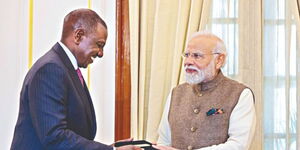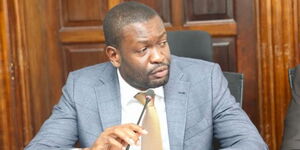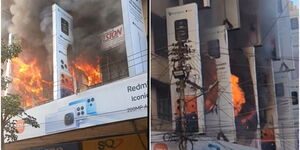Nuclear Power and Energy Agency (NuPEA) Chief Executive Officer (CEO) Justus Wabuyabo has assured Kenyans that the country’s management of nuclear waste is top-notch, citing advanced technology systems that would ensure the proper disposal of nuclear waste.
While speaking on NTV on Wednesday, July 9, Wabuyabo revealed that through technology, nuclear waste, mostly made up of spent nuclear fuel, is kept within the atomic plant, preventing it from being exposed to the outside world.
To manage nuclear waste that would be generated in the plant, Wabayabo further noted that besides the guardrails to limit exposure to the environment, the spent fuel would then be put in dry casks for enhanced storage.
“When we are talking about nuclear, I can assure Kenyans that management of nuclear waste should not be a worry at all. The available technology now is such that the spent nuclear fuel is kept within the plant,” Wabuyabo stated.
The NuPEA boss noted that this would be stored for one hundred years, as is typical in nuclear plants, after which it would be collected and put in casks. He detailed that plans were underway by the international nuclear community to dig deep underground depositories where the casks could then be safely disposed of.
Thereafter, suppliers from the international community who would provide the raw material of uranium would then come and collect the casks and safely put them in the depositories, where they would then be safely stored.
“When we set up a plant, we will have an agreement with the vendor country. This is the country that will give us the technology. This country that sold us the technology during the decommissioning process is expected to come in, collect the casks, and put them in the final disposal sites,” Wabuyabo stated.
His sentiments came amidst plans by the Kenyan government, led by President William Ruto, to set up the country’s first-ever nuclear plant in Siaya County.
The construction of the 1,000MW nuclear plant is set to begin in 2027 and begin operations by 2034. It is also set to cost Ksh500 billion.
As per reports coming out of the government, the plant is set to help plug the country’s energy deficit, with Energy Cabinet Secretary Opiyo Wandayi previously noting that the plant will supply electricity to industries, businesses, and homes.
Currently, the ministry is working on identifying the most suitable location around the lake to host the project.
Essentially, nuclear plants are constructed near water bodies because water is used as a coolant and moderator.
Despite the International Atomic Energy Agency (IAEA) giving approval for the country to start setting up the plant in 2021, plans to construct the power station have been in the works since 2009.












